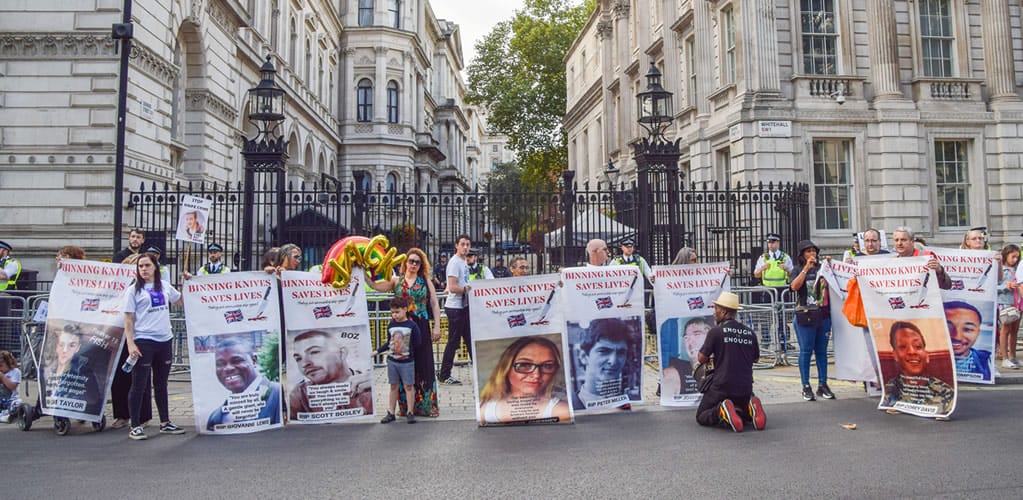Rising knife crime in London is linked to austerity cuts to youth services
In 2023, London saw a sharp increase in knife and gun crime, primarily attributed to significant police funding cuts and austerity measures by the Conservative government, which undermined efforts to tackle the escalating violence effectively.

N ew data released by the Office for National Statistics (ONS) shows knife and gun crime in London rose sharply in the 12 months before December 2023.
The Metropolitan Police Service saw a 21% increase in knife or sharp instrument incidents across the capital between 2022 and 2023. Between January 2023 and January 2024, the rate of increase stood at 16%.
In January 2024, these alarming figures prompted actor Idris Elba to launch the Don’t Stop Your Future campaign. The aim was to raise public awareness and amplify the voices of those marginalised communities most affected in the capital. Elba called for a ban on zombie knives and machetes and, crucially, for better funding for youth services.
Across England and Wales, knife crime and violence has worsened over the past decade. The ONS has shown that the number of violent and sexual offences involving knives and sharp instruments (as recorded by police forces, excluding Greater Manchester Police) rose from 642 (in the 12 months between April 2010 and March 2011) to 891 (in the 12 months from January to December 2023). That represents a 38% rise.
Polls show that crime, policing and personal safety are the top concerns cited by most Londoners ahead of the 2024 mayoral elections. Despite these growing concerns, however, there is little consensus on how to solve the problem.
Crime and justice approaches
To tackle violent offending, politicians routinely propose imposing longer sentences for criminals and increasing numbers of police.
Recent figures from the Ministry of Justice, however, suggest that the average custodial sentence for knife crime has actually increased by 6% in the last decade. The most common outcome for all knife offences is immediate custody, rather than a suspended sentence or community service.
By 2019, the number of people in England and Wales sentenced to 20 or more years had quadrupled compared to a decade earlier. There has also been a marked increase in the number of people in prison who received a long life sentence from a young age. And yet, despite the increasing use of more punitive approaches, especially for young offenders, reoffending rates continue to increase.
Politicians have also suggested that failures to fund the police over the past ten years have resulted in increasing levels of crime, including violent crime. London mayor Sadiq Khan has often been criticised, including by Prime Minister Rishi Sunak, for failing to solve the knife crime epidemic.
Khan has noted, however, that since the Conservative government came to power, cuts of £1 billion in real terms to Met police budgets have had disastrous consequences on levels of knife crime in the capital.
In 2018, leaked Home Office documents revealed that the government itself had concluded that government cuts to police funding “may have encouraged” violent offenders and have “likely contributed” to a rise in serious violent crime.
Adequate funding for the police and community police, in particular, is crucial. However, there is increasing evidence from places like Glasgow that demonstrate the importance of tackling the root causes that underpin violence, focusing particularly in inequality and poverty and how these drive violence in many communities. Indeed, Scotland has successfully reduced violent crime by seeing violence as an epidemic and a public health issue.

— The government itself had concluded that government cuts to police funding “may have encouraged” violent offenders and have “likely contributed” to a rise in serious violent crime.
Tackling inequality
In 2019, Sadiq Khan set up the Violence Reduction Unit in London. This programme takes a holistic approach to tackling the complex issue of knife crime and violent offending.
In Scotland, the Scottish Violence Reduction Unit, in operation since 2006, similarly frames violent crime as a public health issue.
By focusing on the root causes, this approach recognises that childhood vulnerabilities need to be tackled in order to prevent the next generation from engaging in violence. This includes addressing poverty, inequality in education, mental health and social isolation, and training and employment. These are all key issues that leave young people vulnerable to becoming involved in criminal activity.
Such holistic approaches allow for the root causes of violence to be diagnosed, and the results demonstrate the benefits. Scotland’s homicide rate halved between 2008 and 2018. In Glasgow, the number of hospital admissions due to assault with a sharp object fell by 62%.
Khan’s Violence Reduction Unit in London focuses on stopping violence before it happens. It seeks to implement preventive measures, including funding early-years support for vulnerable parents, investing in youth services in deprived areas and boosting education and community services.
These early interventions are key to reducing violent crime over the long-term. However, to be successful, they need to be sustainably funded and adequately resourced.
No city or local authority, including London, has enough funding to make this possible without help from central government. As the 2024 Financial Distress in Local Authorities parliamentary report shows, systemic underfunding of local government in England has resulted in many councils facing insolvency.
The government is now grappling with a £4 billion hole in council funding for 2024-25. And local services, including those on which initiatives like the Violence Reduction Unit depend on for their success, are at risk of being defunded.
In 2021, a House of Lords report on public services and child vulnerability argued that over 1 million vulnerable children were experiencing reduced life chances due to austerity-led cuts, since 2010, to early years funding and youth support.
In England, 30% of children live below the poverty line. Children in London in particular experience disproportionately high levels of deprivation. In the most deprived areas, children are at disproportionate risk of serious harm. Data from the National Society for the Prevention of Cruelty to Children shows a 106% increase in child cruelty and neglect offences in England between 2017 and 2023.
As the charity notes: “England’s largest councils face overspending their budgets by over £600m this year, as ‘uncontrollable’ spending pressures drive up the cost of delivering services to vulnerable children.”
The Young Men’s Christian Association charity estimates that the government has cut £1.1 billion in youth services funding since 2012 in England. It says this represents a real-terms expenditure cut of 74% from 2010-11’s £1.48 billion spend.
Until the government at every level recognises the link between cuts to funding public services and the rise in knife crime, violence will increase. It is those children already at risk who will continue to bear the brunt.






[Read our Comments Guidelines]